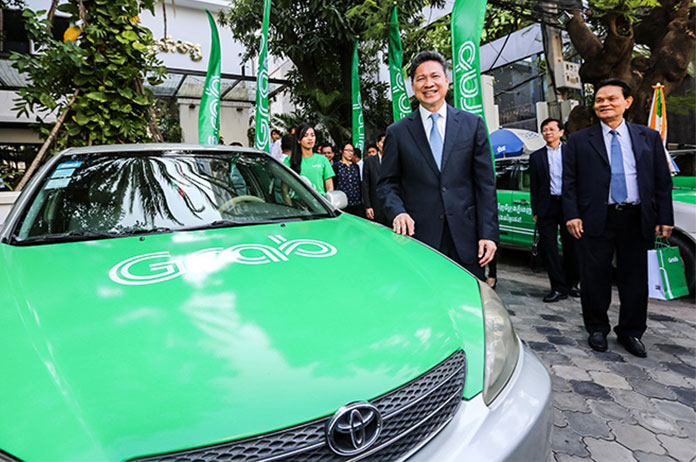Grab Seals Ride-share Deal With Uber

Singapore-based ride sharing company Grab yesterday announced its acquisition of the Southeast Asia operations of its giant American rival Uber, the deal came just over three months after Grab went online in Cambodia last December.
Grab says it will extend its leadership as the most cost-efficient Southeast Asian platform, as it takes over Uber’s operations and assets in Cambodia, Indonesia, Malaysia, Myanmar, the Philippines, Singapore, Thailand, and Vietnam.
As part of the acquisition, Uber will take a 27.5 percent stake in Grab and Uber CEO Dara Khosrowshahi will join Grab’s board. Anthony Tan, Grab group CEO and co-founder, said that the combined business was the leading platform in the region. Together with Uber, Grab was now in an even better position to fulfill the company’s promise to serve customers.
“We are humbled that a company born in Southeast Asia has built one of the largest platforms that millions of consumers use daily and provides income opportunities to more than five million people,” Mr. Tan said. “Today’s acquisition marks the beginning of a new era. Their trust in us as a transport brand allows us to look towards the next step as a company: improving people’s lives through food, payments, and financial services.”
Dara Khosrowshahi, CEO of Uber, said that the deal was a testament to Uber’s exceptional growth across Southeast Asia over the last five years. “It will help us double down on our plans for growth as we invest heavily in our products and technology to create the best customer experience on the planet,” he said. “We’re excited to take this step with Anthony and his entire team at Grab and look forward to Grab’s future in Southeast Asia.”
On December 19 last year, the day of Grab’s official launch in Cambodia, the company signed a memorandum of understanding (MOU) with the Ministry of Public Works and Transport to support the kingdom’s infrastructure development. Grab says it provides safe and reliable on-demand transport and will use its technology and data to improve road safety and traffic management in Cambodia.
On January 20, Grab signed an MoU with Cambodia’s Anti-Corruption Unit, confirming the company’s commitment to good governance, strict compliance, and the highest standards of operations in the country. On February 26, Grab also reached an agreement with the United Nations Development Programme, which aims to improve living standards in urban areas by reducing pollution and traffic congestion.
Grab says the deal will integrate Uber’s ride-sharing and food delivery business in the region into Grab’s multi-modal transportation and fintech platform. With the combined business, Grab will drive towards becoming the number one online-to-offline mobile platform in Southeast Asia and a major player in food delivery.
Tan Hooi Ling, co-founder of Grab, said that through the deal with Uber, Grab will extend its GrabFood, which will be another great use to drive the continued adoption of the GrabPay mobile wallet and support the company’s growing financial services platform. “We will rapidly and efficiently expand GrabFood into all major SEA countries in the next quarter,” Mr. Tan said. “We’re going to create more value for our growing ecosystem of consumers, drivers, agents – and now merchants and delivery partners.”
According to a 2016 report by Google, Southeast Asia’s ride-sharing and taxi on-demand service could hit $13 billion by 2025 with 29 million monthly riders – up from an estimated 7.3 million now – growing at 18 percent per year.